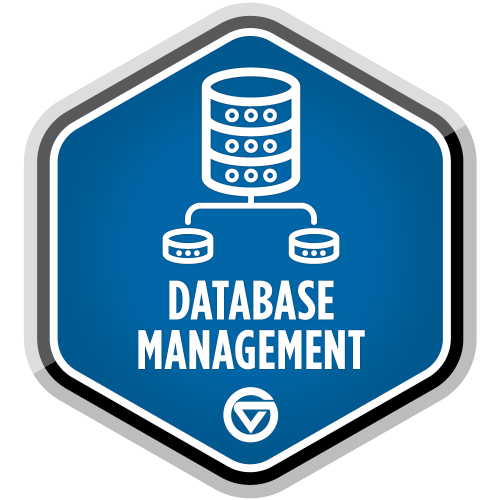Database Management
Graduate Badge
Grand Rapids • Face to face • 9 Credits

Graduate Badge
Grand Rapids • Face to face • 9 Credits
The College of Computing's Database Management Graduate Badge is designed to prepare students with the skills necessary to create both relational and non-relational databases.
This badge covers a range of topics, including the use of computational methods for knowledge discovery in bioinformatics and medicine, addressing challenges in clinical information systems, and creating visualizations for complex data sets. Students will also learn how to use the performance of relational database management systems and work with emerging non-relational databases, such as object-oriented and XML databases, providing them with the expertise needed to manage and optimize modern database systems.
Course content for this badge will allow students to learn topics such as creating relational and non-relational databases, utilizing computational methods for knowledge discovery in bioinformatics and medicine, and addressing challenges in clinical information systems. The badge also covers creating visualizations for complex data sets, tuning the performance of relational database management systems, and working with emerging non-relational databases like object-oriented and XML databases.
Earning this badge equips students with essential skills in managing relational and non-relational databases, crucial for today’s data-driven world. Mastering database management enhances your ability to optimize data storage and ensure data integrity, making you a valuable asset in fields like data analytics and IT. Whether pursued through continuing education or as part of a degree, this badge allows you to showcase your expertise to employers via digital platforms. With a flexible, focused, and small class format, students receive personalized instruction to deepen their understanding of database management.
A digital badge, or badge, is a record of achievement that recognizes a student's completion of a coherent and meaningful academic experience. GVSU offers both credit and non-credit bearing badges as digital credentials. Credit-bearing badges include anywhere from 0.5 to 15 academic credits and may include additional noncredit criteria. Credit-bearing badges are also posted to the academic transcript.

College of Computing
Dr. Robert Adams, Ph.D.
C-2-100 Mackinac Hall
(616)
331-2060
[email protected]
gvsu.edu/computing
Develop and implement a set of techniques or analytics applications to transform raw data into meaningful information using data-oriented programming languages and visualization software. Apply data mining, data modeling, natural language processing, and machine learning to extract and analyze information from large structured and unstructured datasets. Visualize, interpret, and report data findings. May create dynamic data reports.
| Annual Earnings | Percentile |
|---|---|
| $ 59,116.28 | 10% |
| $ 77,673.64 | 25% |
| $ 98,822.12 | 50% |
| $124,504.82 | 75% |
| $147,601.58 | 90% |
Administer, test, and implement computer databases, applying knowledge of database management systems. Coordinate changes to computer databases. Identify, investigate, and resolve database performance issues, database capacity, and database scalability. May plan, coordinate, and implement security measures to safeguard computer databases.
Top skills| Annual Earnings | Percentile |
|---|---|
| $ 50,857.21 | 10% |
| $ 66,001.09 | 25% |
| $ 97,162.88 | 50% |
| $124,001.22 | 75% |
| $151,292.64 | 90% |
Design, model, or implement corporate data warehousing activities. Program and configure warehouses of database information and provide support to warehouse users.
Top skills| Annual Earnings | Percentile |
|---|---|
| $ 69,705.07 | 10% |
| $ 91,523.39 | 25% |
| $119,910.75 | 50% |
| $142,615.91 | 75% |
| $168,418.27 | 90% |
Design strategies for enterprise databases, data warehouse systems, and multidimensional networks. Set standards for database operations, programming, query processes, and security. Model, design, and construct large relational databases or data warehouses. Create and optimize data models for warehouse infrastructure and workflow. Integrate new systems with existing warehouse structure and refine system performance and functionality.
Top skills| Annual Earnings | Percentile |
|---|---|
| $ 69,705.07 | 10% |
| $ 91,523.39 | 25% |
| $119,910.75 | 50% |
| $142,615.91 | 75% |
| $168,418.27 | 90% |